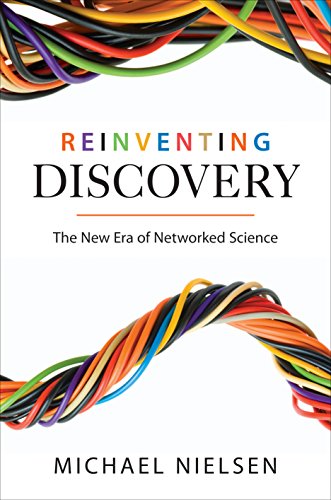This book is a fantastic summary of the uneasy meeting of research science and recent trends in online collaboration technology. A tight narrative, some fascinating examples of successes where science has dipped its toe into the online collaboration world, and solid analysis of the examples of failures.
This book is an excellent argument in favor of a more open science culture. The author convincingly makes the point that the current academic practice of attributing credit almost exclusively to papers and grants is old fashioned and harmful to the progress of modern science.
Reinventing discovery: the new era of networked science is a critical examination of the potentials of digital technologies, especially of collaborations that happen via the web. In his thesis, Nielsen does not aim to introduce new set of technologies, instead he charts how existing platforms can be optimally utilised.
Excellent information pertaining to the optimization of shared knowledge to enable interested minds to create fasinating networks. Our ability to design an open platform for participation, in my opinion, will transform traditional education and encourage involvement for all to attempt to answer complex questions once preserved only for serious scientists or researchers.
To be honest, I was expecting descriptions of open science projects and how scientists can use these techniques to improve their careers. The book went a step ahead and actually inspired me to think how society can be benefited by sharing the scientific knowledge.
This was a comprehensive look at the possible ways for science to evolve from the current "ivory tower" perspective. Nielsen offers several examples of projects that have succeeded in making real discoveries and/or accomplishments using crowdsourcing and open science strategies.
This book really lines up with where some of our brightest minds would be well placed. It centers on Science and Math disciplines, but its application goes for beyond.
The author contends that the use of various Internet tools has shown the potential for improving scientific research, and that a better and more effective use of various Internet tools could significantly improve and accelerate the process of scientific research. More specifically, the author: (1) compares and contrasts traditional scientific research with contemporary scientific research; (2) notes the strengths, weaknesses, and limitations of each approach; and (3) discusses various ways that Internet tools can be used to conduct, and improve the process of, scientific research.
Leading scientist (specialist in quantum computation) writes great book about future of science itself - fascinating, important... = must read.
I read Nielsen's new book cover to cover on my flights to / from an Open Access Week event in Tucson this week and I give it my strongest recommendation for a pleasurable read about a crucial topic. I am a scientist and my students and I practice open science as much as possible--open notebook science, open protocols, open data, open proposals, etc.
I have read many books purchased at Amazon, but I have never written or submitted a review on any of them. This is the first book that I felt compelled on some level to comment on, as it really is the best manifesto for open science that I have read to date.
Nielsen uses great examples in this easy to read exposition promoting the use of open science. A must read for anyone interested in the sciences, and for scientists in particular.
"How the Internet is transforming science"
This review is for the Audible version...
If you laid out the books "The Tipping Point," "We Are Anonymous" and "Freakonomics," this book would neatly fill the empty space among them.
This book campaigns for open science: a scientific culture in which data and ideas are shared more freely, with the goal of facilitating large-scale collaborations among people with diverse scientific backgrounds (including people without formal scientific training). A key idea is that oftentimes a large scientific task can be divided into smaller, modular, specialized tasks.
